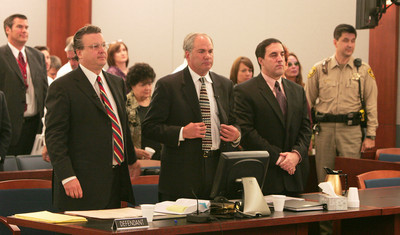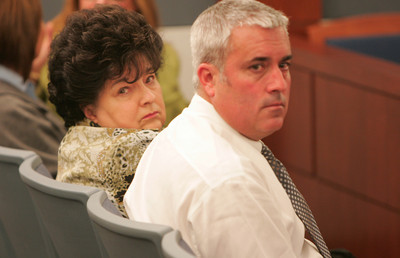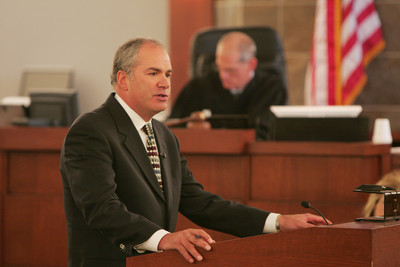Insanity defense begins
Wealthy Reno pawnshop owner Darren Mack abused illegal drugs to intensify his sexual encounters, but the drugs eventually made Mack so delusional that he shot the judge presiding over his divorce -- after first killing his estranged wife in self-defense, defense attorneys said Wednesday.
"Darren's mind was essentially raped, by the drugs, of his reason and judgment," lawyer David Chesnoff told jurors during opening statements Wednesday.
Mack, 46, is pleading not guilty and not guilty by reason of insanity to the murder and attempted murder charges against him. He does not have to delineate which defense he is using for each charge until after the prosecution concludes its case. But in the defense's two-part opening statement, lawyer Scott Freeman alleged that 39-year-old Charla Mack threatened her husband with a gun before he fought back to defend himself. Chesnoff then told the jury Mack was out of his mind when he shot the judge "to send a message."
Prosecutors Christopher Lalli and Robert Daskas said that Mack was a methodical, cold-blooded killer. He plotted to end his heated divorce by killing Charla Mack and assassinating Family Court Judge Chuck Weller, the prosecutors said.
"It was a plan formulated and memorialized by the defendant in his own writing," Daskas said, referring to what appeared to be a "to-do" list authorities found in Mack's Reno town house. Included on the list were: "end problem" and "parking garage-if yes."
Mack is accused of shooting Weller in the chest sniper-style from a parking garage across from the judge's courthouse office. Weller survived and is expected to testify during the trial. At the time, Mack had been trying to appeal his divorce settlement.
On June 12, 2006, Charla Mack drove to her husband's town house to drop off their daughter, then 8 years old, because they shared custody.
While the girl was upstairs watching TV with a close friend of her father's, Darren Mack stabbed Charla at least six times, Daskas said.
Defense attorneys painted Charla as a physically and verbally abusive wife. Her own step-grandmother, whom Mack believed to be clairvoyant, predicted Charla would one day stab her husband and that prediction prompted him to start carrying around a knife, his lawyers said.
Freeman said Mack had loved his wife so unconditionally that he allowed her to have sex with other men and women so that she could satisfy her sexual appetite.
Daskas said it was the other way around, that Charla Mack accommodated her husband's interests in alternative sexual encounters and his interest in "wife-swapping."
On the morning of her death, Charla Mack had demanded Darren Mack's family pay her or Mack would never see his daughter again, Freeman said. "She came to threaten Darren into submission," he said.
When Darren Mack walked away from the argument, she pushed him and a fight ensued, Freeman said.
When Mack's .22-caliber gun fell out of his pocket, Charla grabbed it and tried to shoot Mack, but the gun misfired, Freeman told the jury.
As she cocked the hammer again to fire, Mack lunged at her. As they fought, he pulled out his knife and plunged it into her carotid artery, Freeman said.
His friend and daughter left the house through the front door as Darren Mack, "on auto-pilot," contemplated an array of escape plans, including surviving in the Northern Nevada mountains, Chesnoff said.
Instead, Mack headed for the airport, but on his way he saw the courthouse and decided to send a message to the family court system, Chesnoff said.
In May 2006, Mack had been so angry about Weller's rulings against him in his divorce case that he had contacted a fathers' rights advocacy group and agreed to a videotaped interview.
In that interview, which prosecutors played for the jury, an obviously agitated Mack compared his contentious divorce proceedings to the Revolutionary War.
"Step up like our forefathers did back in 1776," he said, urging the fathers and soon to be ex-husbands of Nevada to rise up against the "tyranny" and "injustice" of family court.
In the interview, taped 18 days before Mack killed his wife and shot the judge, Mack spelled out his motive for his crimes, prosecutors said.
"The defendant's anger brewed," Daskas said. "Darren Mack had a problem, and 18 days later he found a solution to that problem."
Killing his wife was the "end problem" entry on his notepad, Daskas said.
Chesnoff, however, said the interview was evidence that Mack was suffering from a serious mental illness.
"If that's not delusional, I don't know what is," Chesnoff said. "He was basically comparing himself to Ben Franklin."
"God's telling him to exercise his Second Amendment rights and end this tyranny," Chesnoff said.
After firing the shot into Weller through a window of the Washoe County courthouse, prosecutors say, Mack drove to Mexico, where he was arrested 11 days later.
The trial was moved to Las Vegas after District Judge Douglas Herndon determined that Mack couldn't get an impartial jury in Washoe County.
Mack, a broad-shouldered former bodybuilder, showed little emotion as he sat in a dark suit next to his attorneys. His face reddened as he heard prosecutors describe Charla Mack dying on the floor of his garage as the couple's daughter watched television upstairs.
Daskas showed pictures of the fit and petite woman lying on the cement floor with a gaping slash at the base of her neck.
After opening statements, prosecutors began calling the first of more than 200 people on the witness list for the trial: Katherine Raven, the forensic pathologist who performed the autopsy on Charla Mack.
Raven said her carotid artery, esophagus and trachea had all been cut.
Raven identified at least six stab wounds on Charla Mack's body, including wounds on her right forearm, right elbow, left wrist and right leg. The wounds could have been sustained while Mack was trying to fend off an attacker, she said.
"It is consistent with defensive wounds," Raven said.
Dominic Gentile, a longtime Las Vegas defense attorney who watched the openings Monday on television, said he believed the jury understands that emotions are aroused during a divorce. "It doesn't take much to push someone over the limit and have an act of violence," he said, adding that the jury might convict Mack of voluntary manslaughter if they feel he was provoked but not in fear for his life.
"But the second part, that's the part that's a little tougher," he said of the judge's shooting. "The question becomes: Was he in such a state of mind, so broken down after the homicide occurred that he basically acted as an insane person? The problem with that is there is going to have to be an explanation as to what looks like very deliberate planning."
The Associated Press contributed to this report. Contact reporter K.C. Howard at khoward@reviewjournal.com or (702) 380-1039.



















